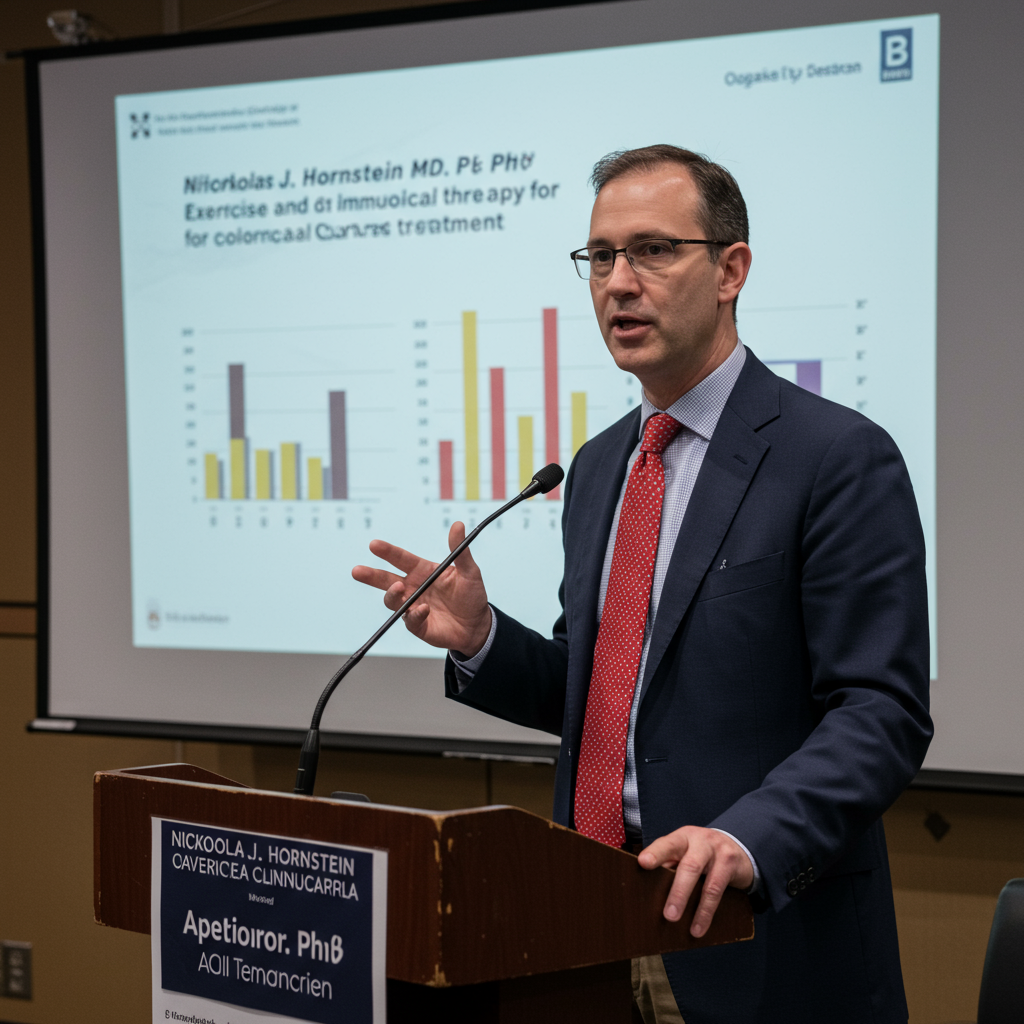Groundbreaking findings revealed at the 2025 American Society of Clinical Oncology (ASCO) Annual Meeting are setting new standards for managing colorectal cancer (CRC). Insights shared by Nicholas J. Hornstein, MD, PhD, from the Donald and Barbara Zucker School of Medicine of Hofstra University and Northwell Health, highlight two pivotal phase 3 trials: ATOMIC and CHALLENGE. These studies offer compelling evidence for innovative therapeutic strategies, potentially transforming approaches to adjuvant treatment and patient well-being. Dr. Hornstein’s expert perspective sheds light on how these trial results could significantly impact clinical practice and improve outcomes for individuals facing colorectal cancer.
Advances in Adjuvant Colorectal Cancer Treatment
The ASCO 2025 meeting provided critical updates for gastrointestinal oncology. A major focus was the adjuvant setting for colorectal cancer, targeting patients who have had surgery to remove the primary tumor. The goal of adjuvant therapy is to eliminate any remaining microscopic cancer cells and prevent recurrence. Two studies stood out for their potential to redefine this crucial phase of treatment.
The ATOMIC Trial: Immunotherapy’s Impact
The phase 3 ATOMIC trial (NCT02912559), also known as Alliance A021502, explored a therapeutic approach for specific stage III colon cancer patients. This study included individuals with deficient mismatch repair (dMMR) or high microsatellite instability (MSI-high) disease. These molecular characteristics often indicate a higher likelihood of response to immunotherapy.
Patients in the ATOMIC trial were randomly assigned to one of two groups after surgery. One group received the standard chemotherapy regimen, modified fluorouracil, leucovorin, and oxaliplatin (mFOLFOX6), alone. The other group received mFOLFOX6 combined with atezolizumab (Tecentriq), a type of immunotherapy known as a PD-L1 inhibitor.
The trial successfully met its primary endpoint: disease-free survival (DFS). Adding atezolizumab to mFOLFOX6 significantly improved outcomes. DFS in the combination arm was an impressive 86.4%. This compared favorably to 76.6% DFS in the mFOLFOX6 alone arm. The statistical significance was strong (Hazard Ratio, 0.50; 95% CI, 0.34-0.72; P < .0001). Dr. Hornstein emphasized that these compelling results establish the mFOLFOX6 and atezolizumab combination as a new standard of care for stage III MSI-high colorectal cancer patients.
Navigating New Standards: Clinical Considerations
While the ATOMIC trial results are practice-changing, they also raise important questions for clinicians. Dr. Hornstein addressed how best to integrate this new standard into daily patient care. A key discussion point revolves around patient selection. Should every eligible patient receive the full combination? Could some patients benefit from immunotherapy alone, perhaps avoiding chemotherapy’s toxicity?
Dr. Hornstein strongly advises against using chemotherapy alone for most dMMR tumors unless there is a very specific and compelling medical reason. A severe pre-existing autoimmune condition exacerbated by immunotherapy might be one such instance. However, less severe conditions like well-controlled osteoarthritis or rheumatoid arthritis would typically not outweigh the benefit of incorporating immunotherapy.
Currently, robust data supporting immunotherapy alone in the adjuvant setting is limited. Dr. Hornstein acknowledged that for certain elderly or frail patients, balancing potential risks and benefits might lead to case-by-case discussions about alternative strategies, although the FDA approval specifically covers the combination. The study design reflected the clinical understanding at the time it was initiated, before immunotherapy alone was widely considered standard for this group. Fortunately, this new combination provides a powerful tool for many patients now.
Understanding the Safety Profile
Combining chemotherapy and immunotherapy necessitates a careful look at the potential side effects. The ATOMIC trial’s safety analysis showed a manageable toxicity profile. Patients in the combination arm experienced toxicities associated with both mFOLFOX6 and atezolizumab individually. The study did not suggest that combining them significantly worsened side effects beyond what is expected from each agent.
Clinicians should remain vigilant for common immunotherapy-related adverse events. These include conditions affecting the lungs (pneumonitis), colon (colitis), and thyroid (hypothyroidism). Skin toxicities are also possible, sometimes occurring early in treatment. Overall, Dr. Hornstein described the addition of atezolizumab as a safe and effective enhancement to conventional chemotherapy for these patients. He noted that managing these specific toxicities is familiar ground, drawing on extensive experience with immunotherapy in other cancers like non-small cell lung cancer and melanoma.
The CHALLENGE Trial: exercise as Powerful Medicine
Beyond traditional drug therapies, the 2025 ASCO meeting also shed light on the profound impact of lifestyle interventions. The phase 3 CHALLENGE trial (NCT00819208), conducted by the Canadian Cancer Trials Group (CCTG CO.21), explored the role of structured exercise in patients who had undergone surgery for localized colon cancer (stage 3 or high-risk stage 2).
This randomized trial compared two very different approaches. One group participated in a structured exercise program. This involved working with a personal trainer and following a regimented weekly exercise plan. The control group received health education materials about exercise. They were informed that exercise is beneficial but weren’t given a structured program or personal coaching.
Many experts anticipated that exercise would show some benefit. However, the magnitude of the results from the CHALLENGE trial was strikingly high. The study demonstrated significantly improved DFS in the group that followed the structured exercise program (HR, 0.72; 95% CI, 0.55-0.94; P = .017).
Exercise Benefit Rivaling Chemotherapy
A particularly compelling finding from the CHALLENGE trial highlighted the powerful impact of the structured exercise intervention. The results indicated that for every 16 patients who participated in the exercise program, one recurrence of cancer or development of a new cancer was prevented.
Dr. Hornstein underscored the unexpected degree of this benefit. He noted that the observed DFS improvement with structured exercise appeared to be on a similar level, or even greater, than the benefit sometimes seen with chemotherapy agents like oxaliplatin. He described this finding as “shocking” in its magnitude. While most people believe exercise is good for overall health, seeing this level of direct impact on cancer recurrence in a randomized trial is significant.
This study provides robust, randomized controlled trial evidence. It moves exercise recommendations beyond general health advice to a critical, evidence-backed component of post-treatment care for colon cancer survivors. Dr. Hornstein is now discussing the CHALLENGE trial findings with all his adjuvant patients. He recounted instances where patients, recognizing the importance, have even asked for prescriptions for gym memberships, viewing exercise as essential as medication. This trial offers concrete data to reinforce the value of exercise to patients.
Integrating Exercise into Patient Regimens
The CHALLENGE trial offers a powerful tool for clinicians. Patients often ask what they can do to prevent cancer recurrence. In the past, a doctor might offer general advice about diet and exercise. Now, armed with the CHALLENGE data, clinicians can discuss exercise with the same level of evidence-based conviction they use for chemotherapy.
Dr. Hornstein advises colleagues to reframe the conversation about exercise. Instead of saying it “could be helpful,” they should emphasize it as “as helpful as some of the chemotherapy we give.” This positions structured physical activity as an important, integrated part of the overall treatment and recovery plan in the adjuvant setting. This shift in communication increases the perceived importance of exercise for patients, encouraging better adherence to regimens. Anecdotally, Dr. Hornstein has seen his patients commit to structured exercise programs over the past couple of months following these discussions.
The success of the CHALLENGE trial is also noteworthy from a research perspective. It was a long-running study focusing on a non-drug intervention. Funding and executing such trials can be challenging because no company stands to profit from an exercise program in the way they would from a new drug. Dr. Hornstein commended the trial team for their ability to conduct a high-quality study that significantly contributes to medical knowledge.
Broader Context from ASCO 2025
While the ATOMIC and CHALLENGE trials represent major strides in colorectal cancer management, the 2025 ASCO meeting featured many other significant updates in gastrointestinal oncology. Dr. Hornstein briefly touched on other notable developments.
These included advancements in targeted therapies for metastatic CRC, such as data from the phase 3 STELLAR-303 trial (NCT05425940) showing a survival benefit with zanzalintinib (a TKI) plus atezolizumab for metastatic microsatellite-stable CRC. Other discussions at the meeting highlighted novel approaches for challenging conditions like peritoneal carcinomatosis, potentially incorporating techniques like pressurized intraperitoneal aerosolized chemotherapy (PIPAC). Updates in gastric, gastroesophageal junction, and pancreatic cancers also showed progress, including potential new standards for resectable gastric/GEJ cancers based on trials like MATTERHORN, and survival benefits with investigational agents like elraglusib in metastatic pancreatic ductal adenocarcinoma. These diverse findings underscore the rapid evolution of cancer treatment across various gastrointestinal tumor types.
The Evolving Landscape of CRC Treatment
The findings from ASCO 2025, particularly the ATOMIC and CHALLENGE trials, reinforce a key trend in oncology: the move toward more personalized and multi-faceted treatment strategies. For CRC, this includes not only powerful targeted therapies and immunotherapies but also recognition of the crucial role of holistic interventions.
Immunotherapy is increasingly seen as vital for certain CRC subtypes, extending beyond the dMMR setting. Researchers continue to explore ways to make immunotherapy effective for microsatellite-stable tumors, which represent the majority of CRC cases. Combining immunotherapy with other agents, such as TKIs or potentially even exercise, is an active area of research.
Furthermore, adjuvant strategies are becoming more refined. Beyond immunotherapy and exercise, evidence from studies like the phase 3 ALASCCA trial (NCT02647099) supports the use of aspirin in the adjuvant setting for certain patients. These diverse tools—immunotherapy, structured exercise, targeted therapies, and agents like aspirin—are all being added to the clinical armamentarium.
Collectively, these advances aim to decrease the burden of disease and reduce recurrence rates in the colorectal cancer patient population. While recurrence still occurs for many patients, each new effective intervention brings the field closer to a future where preventing relapse is a more achievable goal. The insights from ASCO 2025 provide significant new avenues for improving treatment and quality of life for CRC patients today.
Frequently Asked Questions
How effective is exercise in preventing colorectal cancer recurrence according to ASCO 2025 findings?
Based on the phase 3 CHALLENGE trial presented at ASCO 2025, a structured exercise program significantly improved disease-free survival (DFS) in patients after surgery for localized colon cancer. The trial showed a 28% reduced risk of recurrence or new cancer development compared to health education alone (HR, 0.72). The benefit was substantial; for every 16 patients exercising, one cancer event was prevented. This level of impact was noted as comparable or potentially greater than some chemotherapy benefits, strongly supporting exercise as a critical component of post-treatment care.
Should all stage III MSI-high CRC patients receive combination chemotherapy and immunotherapy after surgery?
Findings from the ATOMIC trial presented at ASCO 2025 support the combination of mFOLFOX6 chemotherapy with atezolizumab immunotherapy as a new standard of care for stage III dMMR/MSI-high colorectal cancer in the adjuvant setting. This combination significantly improved disease-free survival (86.4% vs 76.6% with chemo alone). While some questions remain about individual patient needs, experts strongly recommend the combination for most eligible patients unless there is a compelling medical contraindication, like a severe autoimmune condition. Immunotherapy alone is not currently a standard adjuvant approach based on existing data.
How can doctors help patients integrate structured exercise into their colorectal cancer recovery plan?
Doctors can leverage the strong evidence from the CHALLENGE trial to emphasize the importance of structured exercise, framing it as an essential part of treatment comparable in impact to some chemotherapy benefits. They can discuss the trial results directly with patients to highlight the proven anti-cancer effects of exercise. This data empowers physicians to make clear, evidence-backed recommendations. While prescribing specific programs or facilities may vary by location (like requesting a “prescription” for a gym pass), the key is communicating exercise’s critical role with the same conviction as other prescribed therapies, encouraging patient buy-in and adherence to a structured activity plan.
Conclusion
The 2025 ASCO Annual Meeting delivered critical insights poised to reshape colorectal cancer management. Findings from the ATOMIC trial solidify a new standard of care for stage III MSI-high patients, adding atezolizumab to chemotherapy for enhanced disease-free survival. Equally impactful, the CHALLENGE trial provides robust evidence demonstrating that structured exercise is a powerful, evidence-backed intervention capable of significantly reducing cancer recurrence, with benefits surprisingly comparable to some chemotherapy agents. These advancements, alongside ongoing research into targeted therapies and other modalities, provide clinicians with increasingly powerful tools to combat CRC, offering renewed hope for improved long-term outcomes and quality of life for patients. Integrating these therapeutic and holistic strategies is the path forward in the fight against colorectal cancer.




